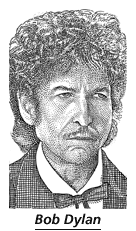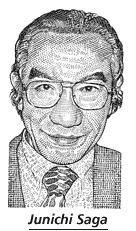Did Bob Dylan Lift Lines From Dr. Saga?Don't Think Twice, It's All Right
- Jonathan Eig
- Jul 7, 2002
- 5 min read
Updated: Nov 28, 2022
Don't Think Twice, It's All Right
Is the View of This Japanese Writer
Originally published in The Wall Street Journal, July 8, 2003
As a 62-year-old physician and writer in a small town north of Tokyo, Junichi Saga knows almost nothing about 62-year-old Bob Dylan.
"Bob Dylan is a very famous American country singer, yes?" asks Dr. Saga. "I'm not familiar with these things."
Mr. Dylan, on the other hand, would seem to be quite familiar with Dr. Saga's work. On the legendary singer-songwriter's most recent studio album, "Love and Theft," he appears to have lifted about a dozen passages from Dr. Saga's book, "Confessions of a Yakuza."
"I'm not quite as cool or forgiving as I sound," sings Mr. Dylan on the song "Floater," from his 2001 album. "I'm not as cool or as forgiving as I might have sounded," writes Dr. Saga on page 158 of his oral history of a Japanese gangster, which was published to little acclaim or profit more than a decade before the release of Mr. Dylan's album. To date, Dr. Saga says he has earned about $8,500 from his book.
Doris Kearns Goodwin and the late Stephen Ambrose, among others, have gotten in some trouble in recent years for doing similar things. But Dr. Saga, unlike a good many other imitated authors, isn't angry. He's delighted.
"Please say hello to Bob Dylan for me because I am very flattered and very happy to hear this news," the writer says. He is hoping that Mr. Dylan's fans might go out and buy the book. "Confessions" has sold only about 25,000 copies in English and fewer still in Japanese. Indeed, the Japanese edition is out of print.
Mr. Dylan's manager, Jeff Rosen, said Mr. Dylan couldn't be reached for comment. "As far as I know," Mr. Rosen said, "Mr. Dylan's work is original." The liner notes for "Love and Theft" list Mr. Dylan as the sole author of the 12 songs on the album.
The songwriter has borrowed material before. He often makes passing references to the Bible or to works of literature in his songs. On "Love and Theft," he briefly quotes a passage from "The Great Gatsby." As an aspiring artist, Mr. Dylan, né Zimmerman, is often said to have taken his name from the late Welsh poet, Dylan Thomas, though Mr. Dylan has sometimes denied that.
He's like "some very imaginative sponge," says Christopher Ricks, a professor of humanities at Boston University, who has lectured on Mr. Dylan's works. Usually, says Mr. Ricks, Mr. Dylan's sponging is a healthy part of the creative process. The songwriter takes a few words, twists them, changes their context, and produces an entirely new work of art.
But Mr. Ricks says he was surprised by the extent to which Mr. Dylan seems to have borrowed from "Confessions of a Yakuza" on his latest album. "No one of these instances was very telling," he says. "But when you put together the whole string of them, it's quite striking."
No one was more surprised than Dr. Saga. The internist, writer and painter lives a life of prosperous, suburban tranquility in Tsuchiura, a small city of 134,000 people north of Tokyo. His home and clinic are set in a dense garden with stone footpaths.
This is where he wrote "Confessions," which is based on the testimony of one of his patients, a retired gangster named Eiji Ijichi. The story is set in pre-World War II Japan. Men and women in his book live hard, rootless lives, filled with gambling, prostitution and violence. The book, Dr. Saga says, is about people who find love despite bad luck and bitter lives. "The two themes are love and the life of an outlaw -- in other words love and theft," he says.
After learning from a reporter that some of his prose had turned up on Mr. Dylan's album, Dr. Saga, who usually favors opera, bought a copy of the CD. "I like this album," he says. "His lines flow from one image to the next and don't always make sense. But they have a great atmosphere."
He says he's pleased that Mr. Dylan read his book -- if, indeed, he did -- and chose to adapt some of the language to fit his songs. Dr. Saga says he has no intention of suing. "I don't want this to become a bad thing," he says. But he would like to see Mr. Dylan acknowledge his source -- perhaps with a note in future editions of the liner notes. "That would be very honorable," the author says.
The similarities between the album and the book were first spotted by an American living in Japan. He recently submitted a comparison of the two works to a Web site devoted to Mr. Dylan's music. Soon after the comparison was posted, "Confessions of a Yakuza" jumped more than 20,000 places, to about 45,000 -- on the Amazon.com list of best-selling books. But Dr. Saga's publisher, Kodansha International, with offices in Tokyo, New York and London, says it's too soon to tell whether the controversy will significantly boost sales.
"I guess we should print the next edition with Bob Dylan's picture on the cover," says Stephen Shaw, editorial director for Kodansha and the editor of "Confessions." Absent a photo, Mr. Shaw says, the publisher would at least like to have a blurb from Mr. Dylan for the book's jacket.
Mr. Shaw says he and other members of the staff at Kodansha were surprised that Mr. Dylan made so little effort to change lines appearing in the book. "It struck me as a little bit lazy," he says. But he doesn't want to make too much of a fuss. "We're flattered as hell, let's face it," Mr. Shaw says.
Mr. Dylan's apparent muse might not have been discovered were it not for Chris Johnson, a Minnesota native and Dylan fan who happened upon a copy of "Confessions" while browsing in a bookstore in Fukuoka. He knew little about Japan's seamy side and was glad to find a book on the subject.
On the first page, Mr. Johnson read the following line: "My old man would sit there like a feudal lord...." It reminded him instantly of a lyric from the Dylan song "Floater": "My old man, he's like some feudal lord."
"I've probably listened to that album at least a hundred times, so the matching phrases just jumped right out at me," says Mr. Johnson, a 29-year-old English teacher in Kitakyushu. "They may as well have been printed in red ink."
He began searching for more phrases from the recording as he read the book, folding down pages as he found them. By the time he had finished the book, he had folded a dozen pages.
Mr. Dylan didn't choose the most poetic or most powerful lines from the book, Mr. Johnson says. He appears at times to have clipped phrases almost randomly. Mr. Johnson has given a lot of thought to the process by which Mr. Dylan wrote his lyrics. He imagines the singer sitting in a hotel in Japan, where he has often appeared over the years, and browsing through "Confessions" as he worked on a new batch of tunes, using lines from the book as kindling for his imagination.
"I kind of wondered if he had done a lot of that before on other albums," says Mr. Johnson. "But if he'd been doing this all along, somebody would have caught him a long time ago."









When Mumbai’s night comes alive, Mumbai escorts become your perfect companions for moments filled with charm and desire. These escorts in Mumbai bring warmth and excitement, making every second unforgettable. Their smile invites you into a world of pleasure and delight.
The magic of Mumbai call girls lies in their gentle touch and magnetic charm. These call girls in Mumbai know how to make you feel special and wanted, creating memories that linger long after they’re gone. Each encounter leaves you craving more.
CTQueen offers premium and private call girl services across India, perfect for those who seek calm, connection, and a touch of warmth in their lives. Our companions are chosen for their pleasant nature, elegance, and ability to make every moment feel natural and comfortable. Whether you’re looking for a relaxing evening, meaningful conversation, or simply someone who respects your space and presence, CTQueen is here to provide a soothing experience. Every booking is handled with complete confidentiality, so your privacy is always respected. Our services are available 24/7, giving you the freedom to choose the time that suits you best. At CTQueen, we believe that companionship should be gentle, honest, and emotionally fulfilling. Let us help you experience thoughtful, personal…
Ctbeauties is your fast and fun solution. You get real choices in one trusted place, with women who understand your time matters. Each listing is carefully placed, clearly written, and ready to impress. Whether you’re in the mood for soft company or fiery chemistry, this platform has it all. Ctbeauties knows how to keep things simple, sexy, and smooth.
call girls in Delhi
call girls in Dehradun
call girls in Goa
call girls in Jaipur
I'm from Bangalore, India, and my name is Shruti Sharma. This blog is fantastic, and I will spread the word about it everywhere. It will be fun for people to work on. By providing a free dating service throughout India, I hope to assist you in finding a beautiful woman in your city. To find out where you are in the area, click this link - Panjim Escorts - Russian Escorts In Mumbai - Delhi Escorts - Call Girls In Btm - Call Girls In Kormangala - Escort Service In Delhi // Bangalore escorts // Goa Escorts // Delhi Escorts //
Looking for premium companionship in the capital? Discover ultimate satisfaction with Ahmedabad Escorts known for elegance and discretion. Whether it's a night out or a private evening, these professionals offer an experience like no other. Explore unmatched pleasure and style with trusted service providers for your most cherished moments.